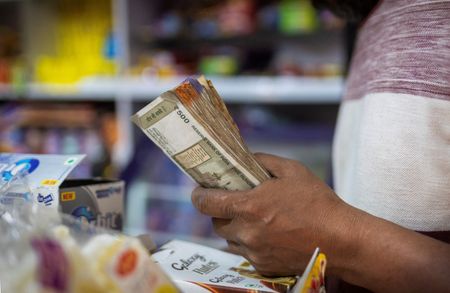By Sam Li and Jeslyn Lerh
SINGAPORE (Reuters) -Oil prices fell on Wednesday as an industry report showing higher crude inventories in the U.S., the world’s biggest crude consumer, reinforced concerns of oversupply, though price declines were limited by sanctions on Russian oil flows.
Brent crude futures eased 11 cents, or 0.2%, to $64.78 a barrel as of 0510 GMT, after gaining 1.1% in the previous session. U.S. West Texas Intermediate crude futures were down 9 cents, or 0.2%, at $60.65 a barrel, after rising 1.4% on Tuesday.
U.S. crude and fuel stocks rose last week, market sources said late on Tuesday, citing American Petroleum Institute figures.
Crude stocks rose by 4.45 million barrels in the week ended November 14, while gasoline inventories climbed by 1.55 million barrels and distillate inventories increased by 577,000 barrels, the API reported, according to the sources.
“Overall, the report was relatively bearish,” said ING commodities strategists, though they cautioned that “market participants appear more concerned about supply risks than the odds of a surplus going forward.”
U.S. sanctions on major Russian producers Rosneft and Lukoil set a November 21 deadline for companies to unwind their dealings with the Russian firms.
The U.S. Treasury on Monday said the sanctions are already squeezing Russia’s oil revenue and are expected to curb its export volumes over time. Crude buyers in China and India have already started switching to alternative suppliers.
“Benchmark prices are range-bound with the market eyeing the (November 21) sanctions’ impact, though there are downward pressures in the background with oversupply sentiment,” said Emril Jamil, a senior oil analyst at LSEG.
Prices gained on Tuesday as investors considered the impact of the U.S. sanctions and as Ukrainian attacks on Russian refineries and export terminals have increased concerns of crude and fuel disruptions.
The worries about Russian supply are being weighed against forecasts from analysts that oil output is in excess of current demand, which has pressured prices.
Following Ukrainian attacks on Russian energy and port infrastructure, profit margins for producing diesel fuel have surged in Europe, reaching their highest since September 2023 on Tuesday. This is occurring amid an increase in refinery margins globally.
Analysts from Chinese brokerage Haitong Futures noted that “oil prices have found support from the strong diesel market but the persistent crude oversupply is keeping investors cautious about chasing further gains in crude.”
Official U.S. government inventory data will be released later on Wednesday. Eight analysts polled by Reuters ahead of that data release estimated on average that crude inventories likely fell by about 600,000 barrels in the week to November 14.
(Reporting by Jeslyn Lerh; Additional reporting by Sam Li and Lewis Jackson in Beijing; Editing by Christian Schmollinger)










